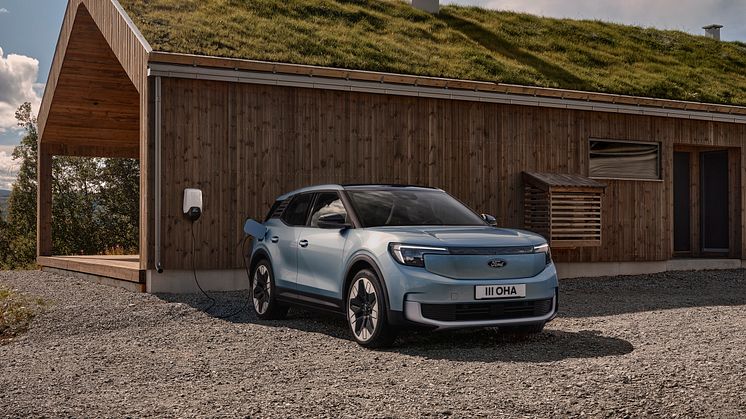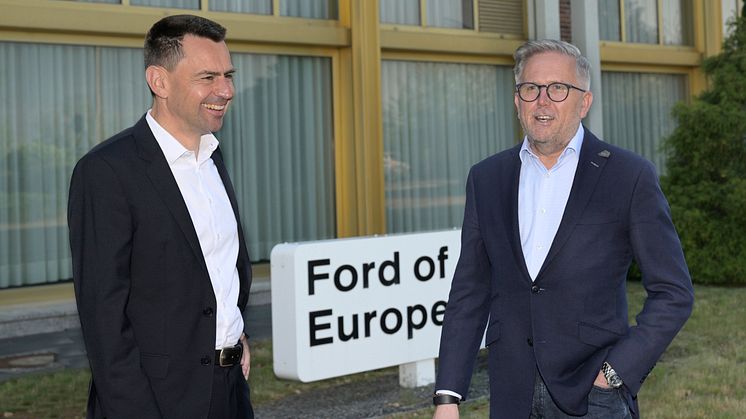
Pressemeddelelse -
Ford Speeds Toward All-Electric, Connected Future in Europe; Chooses Valencia Plant, Spain, for Next-Gen EV Architecture
- Ford takes next step in its transformation; selects Valencia plant as best positioned to produce vehicles based on a next-generation electric vehicle architecture
- Ford reiterates its commitment to Germany with a $2 billion investment in a state-of-the-art electric vehicle center in Cologne, where production will start in late 2023
- Advances Ford’s goal to achieve zero emissions for all vehicle sales in Europe and carbon neutrality across its European footprint of facilities, logistics and suppliers by 2035
COLOGNE, Germany, June 22, 2022 – Ford in Europe today announced another important stride toward an all-electric future, confirming that it has chosen its plant in Valencia, Spain, as the preferred site to assemble vehicles based on a next-generation electric vehicle architecture. Pending product approval, the Valencia plant could produce breakthrough electric and connected vehicles beginning later this decade.
Ford is also moving forward with a $2 billion conversion of its Cologne, Germany, operations to begin producing electric passenger vehicles starting in 2023. Ford’s European strategy calls for an exciting line-up of electric vehicles, including an electric version of the popular Ford Puma and extending its leadership in the commercial segment with electric Ford Pro vehicles and connected services. By 2026, Ford in Europe plans to sell 600,000 electric vehicles annually.
“We are committed to building a vibrant, sustainable business in Europe as part of our Ford+ plan, and that requires focus and making tough choices,” said Jim Farley, Ford president and CEO. “The European auto industry is extremely competitive, and to thrive and grow we can never settle for less than unbelievably great products, a delightful customer experience, ultra-lean operations and a talented and motivated team.”
Continent-wide electric vehicle sales continue to grow rapidly (up 65% to 2.3 million in 20211) and the European Parliament voted earlier this month to set new CO2 targets for light-duty vehicles, including a requirement that new sales be 100% zero emission vehicles by 2035.
“We are accelerating our transformation in Europe, reimagining how we do business and building a future where amazing vehicles and relentless focus on customer experience goes hand-in-hand with protecting our planet,” said Stuart Rowley, chair, Ford of Europe and chief transformation & quality officer, Ford Motor Company.
“Bringing our all-new electric vehicle architecture to Valencia will help us build a profitable business in Europe, secure high value employment and increase Ford’s offering of premium electric, high performance, fully connected vehicles that meet the demand of our European customers.
The decision announced today followed the conclusion of comprehensive consultations with teams in Valencia, Spain and Saarlouis, Germany. Ford’s plant in Saarlouis will continue to produce the Ford Focus passenger car, while the company is also evaluating options for future site concepts.
Ford reiterates its commitment to Germany
Ford also today reiterated its commitment to Germany as the headquarters of its European Model e businessand the site of its first domestic European electric vehicle production. The state-of-the art Cologne Electrification Centre will start production in late 2023.
“Ford is investing heavily in electric vehicle manufacturing operations in Germany, and we are committed to the country as our headquarters location in Europe,” said Rowley. “We look forward to progressing this work with our partners in Germany and across the whole region. To secure new product in Europe we need winning product designs, outstanding technology and engineering, optimized sourcing and an evolution of our industrial operations to ensure they are fully oriented to an electrified world.”
Next generation architecture a critical component of Ford’s all-electric future in Europe
The next generation architecture is a critical step in the transformation of Ford in Europe to achieve an all-electric future and build a thriving business while making a positive contribution to society and reducing emissions in line with the Paris Climate Agreement.
Ford’s plans for all-electric future in Europe supports the global goal of 2 million+ annual production of EVs by 2026 and 10% company adjusted EBIT margin by 2026.
[1] International Energy Agency Global EV Outlook 2022, May 2022
# # #
Følg Ford på Mynewsdesk – Ford.dk– Facebook – Instagram – LinkedIn
Fotos og mere information findes på Ford Danmarks pressecenter: http://www.mynewsdesk.com/dk/pressroom/ford-motor-company
# # #
Alle ovenstående informationer er gældende for tidspunktet, hvor den pågældende pressemeddelelse er udgivet. Informationerne kan ændre sig, ligesom specifikationer og funktioner i pressemeddelelserne kan variere fra marked til marked. Ford Danmark forpligter sig ikke til at opdatere disse udsagn.
Emner
Kategorier
About Ford Motor Company
Ford Motor Company is a global company based in Dearborn, Michigan, that is committed to helping build a better world, where every person is free to move and pursue their dreams. The company’s Ford+ plan for growth and value creation combines existing strengths, new capabilities and always-on relationships with customers to enrich experiences for and deepen the loyalty of those customers. Ford develops and delivers innovative, must-have Ford trucks, sport utility vehicles, commercial vans and cars and Lincoln luxury vehicles, as well as connected services. Additionally, Ford is establishing leadership positions in mobility solutions, including self-driving technology, and provides financial services through Ford Motor Credit Company. Ford employs about 182,000 people worldwide. More information about the company, its products and Ford Credit is available at corporate.ford.com.
Ford of Europe is responsible for producing, selling and servicing Ford brand vehicles in 50 individual markets and employs approximately 41,000 employees at its wholly owned facilities and consolidated joint ventures and approximately 55,000 people when unconsolidated businesses are included. In addition to Ford Motor Credit Company, Ford Europe operations include Ford Customer Service Division and 14 manufacturing facilities (10 wholly owned facilities and four unconsolidated joint venture facilities). The first Ford cars were shipped to Europe in 1903 – the same year Ford Motor Company was founded. European production started in 1911.





